With very few exceptions, if I’ve even partially enjoyed a book, and someone has bothered to adapt that book into a movie, I will seek out and watch said movie. Often this proves a mistake, and my pleasant memories of a novel become irrevocably tainted by a bland or clumsy or incoherent interpretation, but I continue to do it, just as I continue to obsessively watch trailers despite the fact that most of them spoil the first two thirds of the movie. I can’t help myself.
What particularly intrigues me, however, are those rare instances when a director, having (I assume) publicly declared his tremendous love and admiration for a novel, decides (or is forced by the studio) to commit the gravest conceivable breach of trust: changing the ending.
Who, I always wonder, made the call? Did they also film the original ending, just in case? On a scale of 1 to Alan Moore, how pissed off was the author upon hearing the news?
Here, then, are six movies that dared to do the unthinkable.
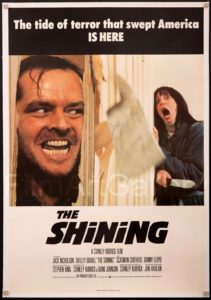
The Shining (1980), dir. Stanley Kubrick
Based on Stephen King’s The Shining (1977)
What’s it about? It’s…The Shining.
How does the movie end? With an axe-wielding Jack Torrence chasing his petrified son Danny into the hedge maze. Danny outwits his father and escapes the maze, fleeing with his mother to safety. Jack freezes to death.
How does the book end? With topiary animals attacking returned chef Dick Halloran and the basement boiler exploding, killing the possessed Jack and destroying the sentient Overlook hotel.
Which ending is better? I mean, explosions and hedge monsters are cool and everything, but it’s all a bit much. I’ll take Torrence frozen in the snow/an old photograph over the big hotel kaboom thank you very much.
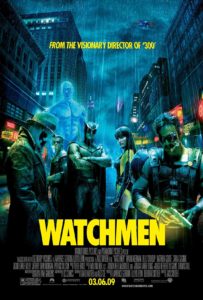
Watchmen (2009), dir. Zack Snyder
Based on Alan Moore and Dave Gibbons’ Watchmen (1987)
What’s it about? In an alternate 1985, at the height of the Cold War, a group of demonstrably unhappy retired vigilantes (and a lone, true blue superman) investigate the murder of one of their own.
How does the book end? With an evil genius dropping a giant psychic squid on New York City, killing millions but uniting the world against a common extraterrestrial enemy.
How does the movie end? With superpowered Dr. Manhattan (a gratuitously nude CGI Billy Crudup) being framed for the destruction of New York, thereby uniting the world against a common superpowered ememy.
Which ending is better? As last year’s vastly superior HBO series demonstrated, if the giant psychic squid option is on the table, you should take it.
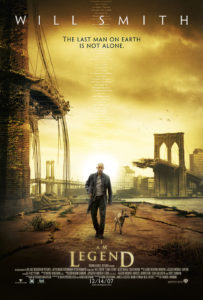
I Am Legend (2007), dir. Francis Lawrence
Based on Richard Matheson’s I Am Legend (1954)
What’s it about? New York-based US Army virologist and last man on earth Robert Neville (Will Smith) and his very good dog Sam (to whom you should not get overly attached) search for a cure for a virus which has killed most of the world’s population and turned the rest into “vampiric albino zombie-like cannibalistic mutants.”
How does the movie end? With Neville handing off a cure for the virus to a young woman bound for a survivors colony before incinerating both himself and the attacking vampire mutants in a big ‘ol fireball.
How does the book end? With Neville being captured by a group of “living-infected”—a small subset who have overcome the disease and are now attempting to build a new society. Neville realizing that he is now a remnant of an old humanity and a figure of terror to the living-infected, takes a suicide pill.
Which ending is better? Again, climatic explosions are very cool, but there’s a disquieting complexity to Matheson’s third act reveal, and to Novel Neville’s closing epiphany, that you just don’t get with Will Smith pulling the pin on a grenade and shoulder-charging a mutant horde.
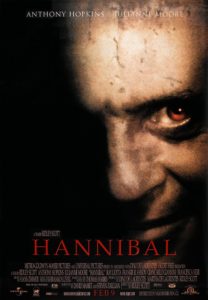
Hannibal (2001), dir. Ridley Scott
Based on Thomas Harris’ Hannibal (1999)
What’s it about?: Set ten years after Silence of the Lambs, Hannibal focuses on the attempt by FBI Special Agent Clarice Starling (Julianne Moore, after Jodie Foster wisely chose not to return) to apprehend the escaped gourmand/serial killer Hannibal Lector (Anthony Hopkins) before Lector’s surviving victim (a rich and disfigured pedophile played by Gary Oldman) captures him. A truly atrocious Ray Liotta plays corrupt Justice Department official Paul Krendler.
How does the film end? Rather than killing Starling, to whom he has been handcuffed as the police close in on Krendler’s lake house, Lector chooses to cut off his own arm. He then evades capture and is last seen on a commercial airplane, sharing a piece of Ray Liotta’s lobotomized brain with a curious child.
How does the book end? In an extraordinarily fucked-up manner. Lector and Starling both eat Krendler’s brain, before Starling . . . breastfeeds Lector. The two then become lovers and run away together.
Which ending is better? It depends on what you’re into, I suppose. Some people like brains, some people like breasts. I’m not here to judge. The airplane picnic is actually kind of sweet, though, and Ray Liotta’s acting is so, so awful in this movie that to see him doing mid-lobotomy dialogue is almost hypnotic. More importantly, Novel Starling’s turn feels like a betrayal of the character established in Silence of the Lambs, so the movie ending wins.
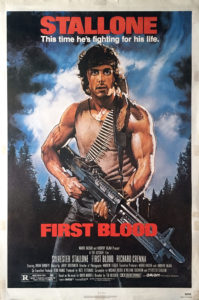
First Blood (aka Rambo) (1982), dir. Ted Kotcheff
Based on David Morrell’s First Blood (1972)
What’s it about?: Muscular Vietnam veteran John Rambo (Sly Stallone) goes into the woods to face off against shitbag Sherrif Will Teasle (Brian Dennehy, RIP) and the abusive police force of a small Washington State town.
How does the film end? With Rambo, at the behest of his mentor and former commanding officer Colonel Sam Trautman (Richard Crenna), sparing the life of Teasle. Rambo then collapses in tears as he recounts his wartime experience and treatment upon returning to the US, before surrendering to Trautman.
How does the book end? Trautman mercy-kills Rambo and Teasle dies of his wounds.
Which one is better? Well, if Rambo dies at the end of the movie (which was the original plan), we are never gifted this ingenious and wholly-realistic gunpowder cauterization scene from Rambo III so…
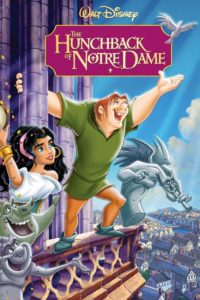
The Hunchback of Notre Dame (1996), dir. Gary Trousdale and Kirk Wise
Based on Victor Hugo’s The Hunchback of Notre-Dame (1831)
What’s it about?: Deformed bell-ringer of Notre-Dame cathedral Quasimodo, his perverted surrogate father Judge Claude Frollo, his love for a Demi Moore-voiced Gypsy woman named Esmeralda, the marionette-heavy 15th century Parisian underworld, wise-cracking gargoyles who may or may not be a figment of his imagination, street festival FOMO…There’s a lot going on.
How does the film end? With the evil Frollo falling to his death, Quasimodo saving Esmeralda from being burned at the stake, and the (extremely fickle) Parisian citizenry embracing the bell-ringer they once scorned.
How does the book end? Quite, quite differently. Esmeralda is hanged, and Quasimodo then kills Frollo before vanishing into the night, never to be seen again. Years later his skeleton is discovered in a mass grave, curled around that of his lost love Esmeralda. The cowards at Disney chose not to go in this direction.
Which one is better? Hugo’s is better. Embracing skeletons crumbling to dust is almost impossible to beat. Having said that, huge props to whoever got Disney to greenlight the adaptation in the first place. This glorious shit has no business being in a kids movie.
